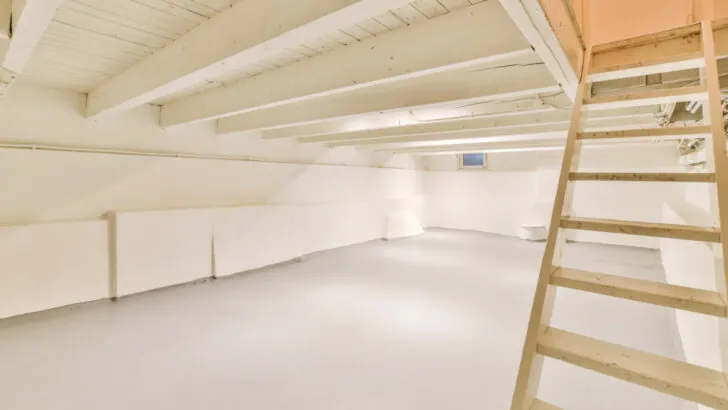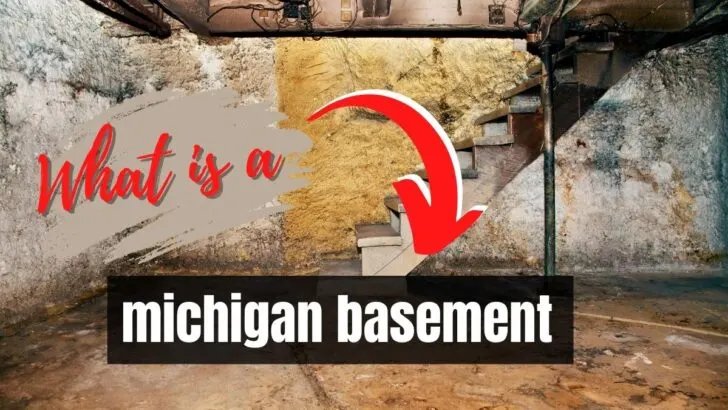There are multiple different types of basements, and as such, a Michigan basement may be unfamiliar to you. If you’ve not encountered these kinds of basements yet, we’re here to help you with that!
A Michigan basement is a crawl space that has been turned into a basement. They have low ceilings, and you generally can’t stand straight up in them. They also tend to be damp and earthy. Structural integrity, water leaks, and moisture are typical issues in many Michigan basements.
Read on to learn more about Michigan basements.
How Can You Build a Michigan Basement?
The state of Michigan’s official building dictionary defines a Michigan basement as:
A previous crawl area that has been excavated, typically 5-7 feet, can be accommodated to a basement.
The digging process starts about 2 feet inside the existing footings and walls to ensure that there will be no compromises to the building’s structural integrity. Then, the crawl space footings are hidden from view by a ledge or shelf constructed in the Michigan basement.
After that, a basement section is carved out by excavating the middle of the crawl space inside this ledge. After that, the contemporary basement is either filled with poured concrete or with blocks.
What To Do In Case There Is a Bowing Wall in Your Michigan Basement?
If you notice the wall in your home’s basement is bowing, you should immediately take action. When a wall has already begun to bow, waiting longer will worsen the problem.
In a traditional type of basement, you can find a few various approaches that can be taken to support a bowed wall. On the other hand, if you live in Michigan and have a basement like this, you will need to install helical tiebacks.
Because the tiebacks are lodged from within the basement, there is no need for any digging to be done on the exterior. A plate made of steel is affixed to the basement, and then a steel rod having helical “blades” is forced through the plate and into the earth.
The basement is then reinforced with additional steel. In many cases, these extend downward and outward about 10 feet till they reach undisturbed and stable soil.
Following this step, you will need to employ an installation crew. They determine the torque and force necessary to curl the tieback, which is being screwed into the ground.
The installation process can be considered complete when the specified torque has been reached.
Benefits Of a Michigan Basement
Michigan basements don’t offer many advantages to a contemporary homeowner. However, these types of basements are perfect for those who want to store or grow fresh produce, roots, and preserved food.
Therefore, their storage was more efficient in the past. The only advantage a Michigan basement currently has is that it is marginally more useful than a crawlspace.
Some Michigan rooms have been renovated and strengthened to use as laundry or electrical rooms. Some individuals utilize them to keep items that perform better in a cool, wet atmosphere.

In places that undergo heavy storms in the summer and spring, they can also be used as storm shelters.
Additionally, Michigan basements are substantially less expensive to purchase and maintain than conventional basements. Money was, in fact, one of the early impetus for the Michigan basement obsession.
Digging out a crawlspace by hand is significantly less expensive than hiring an inspector and contractor to complete the work.
Michigan basements aren’t typically sought after in real estate searches. Either they’re here, or they’re not. For a contemporary home, they don’t add any intrinsic value. Especially in light of the numerous drawbacks they have.
Drawbacks Of Having a Michigan Basement
To start, Michigan basements have various problems. They are virtually always moist, which causes holes in the walls.
These openings let in a great deal of moisture, which they trap because they are surrounded by porous stone and earth.
Additionally, they are very vulnerable to flooding. The rapid accumulation of water in these regions renders them useless during periods of heavy rain or when melting snow exerts a great force on the ground.
Furthermore, Michigan basements are areas where pests can infiltrate and breed immediately beneath your house. Your Michigan basement may become home to creatures like ants, spiders, bats, rats, and raccoons who are happy to dwell there.
Radon gas can also enter your home through Michigan basements. Air will travel upward mostly through the bottom of a home due to the air pressure from above the crawl space, and this air movement from the earth to the home may contain hazardous radon gas.
Finally, the foundation of your house may be at risk due to Michigan basements. This is because these areas were dug below the existing crawl space and into the house’s base, which might cause structural damage.
The foundation of your Michigan home may be harmed by uninspected, inadequately fortified, or frequently flooded or eroded basements.
If left untreated, foundation issues can be very costly and unsafe. Over the years, many basements in Michigan have been reinforced with cinderblock, earthen walls, and retaining walls, but not all of them.
Final Words on a Michigan Basement
Michigan basements refer to any crawl area that has been extended to construct a rudimentary basement. They can still receive the name even if they are not located in Michigan. They are relics from a bygone period and, in today’s technologically advanced world, they frequently cause more issues than they resolve.
Despite the difficulties associated with these areas, numerous homes still have them, and several individuals continue to make regular use of them.


